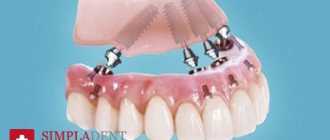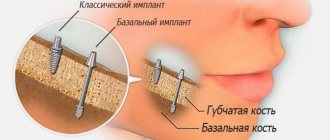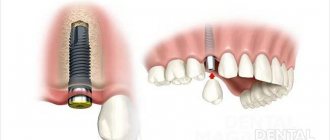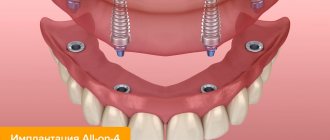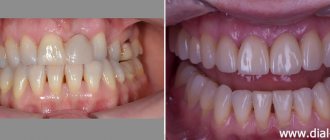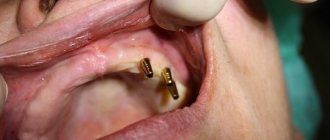Keeping all your teeth by the age of 50-60 is a great success. If we look at the statistics, the conclusions are disappointing: by this age, more than half of the Russian population has already lost teeth and is coping with the situation with the help of dentures. And, as a rule, removable.
Subscribe and read Express Newspaper in:
Many Russians simply have not heard about alternatives, that is, about fixed prostheses attached to implants. In the meantime, this is a reliable and advanced method that allows you to return your smile and the ability to eat normally in literally 1 day.
Together with dental experts, the editors of Express Gazeta figured out how such technologies work, is it true that treatment will only take one day, which implants are suitable for this, and whether you can trust all doctors with your health.
Ivan Pavlovich Kopylov is an implantologist and maxillofacial surgeon. Experience: more than 13 years. Works primarily with complex implantation technologies with immediate loading. Certified specialist in the application of All-on-3 (Trefoil) and All-on-4 protocols from Nobel Biocare.
Think carefully before installing removable dentures
Removable structures are the most obvious option for dental prosthetics for Russians, which they turn to due to their financial affordability. But, unfortunately, this method is not a complete replacement for living teeth, since removable dentures do not have “roots.” They have to be secured on the gums (if there are no teeth left) or on the teeth themselves (if any), which in the future is fraught with additional difficulties and discomfort.
All the troubles of removable prosthetics originate from the main problem - the prosthesis does not use the jawbone at all, and it dissolves due to lack of load and cellular nutrition. It also sags unevenly, which is why the structure fits tightly to the gum in one place, and a gap forms in another. Consequently, the denture becomes very uncomfortable: it doesn’t hold well, it can fall out (at any moment in front of others), and chewing with it is painful and uncomfortable. It is not surprising that everyone who has such prostheses experiences psychological discomfort and tries to communicate less.
The photo shows an example of how bone tissue atrophy occurs and what its consequences are. Due to the absence of teeth and even prolonged wearing of removable dentures, the lower third of the face decreases, the chin moves forward, and the lips become thin. Many wrinkles form. By the way, let’s jump ahead and tell you right away: implantation allows you to get rid of them even without plastic surgery or fillers.
Missing teeth are the main cause of wrinkles around the mouth. Solution? Dental restoration. Photo: Smile-at-Once
In addition to this, removable structures have a lot of other disadvantages - they are not easy to get used to, and even after adaptation, there is still a feeling that there are fake teeth in your mouth. They are plagued by a feeling of heaviness, itching and pain in the gums, increased salivation and bad breath. Due to blocking of receptors, food loses its taste, and many favorite dishes are banned.
initial situation
The patient is 60 years old, does not smoke, without systemic diseases. I went to the clinic for a routine preventive examination. Clinical examination showed the presence of previously installed ceramic crowns on the central incisors of the upper jaw; the crowns were sound. Let's look at the photo:
On the gum, in the projection of the root of tooth 11, a fistula
with serous-purulent discharge was determined.
In the projection of the root of tooth 21, the gums are hyperemic. Objective data raised suspicions about the presence of inflammatory processes in the area of the roots of the teeth. An X-ray revealed resorption of roots 11 and 21
, which was not subject to conservative treatment.
How implantation allows you to get dentures that don’t fall off
Implantation is a small operation in which a special titanium pin (implant) is installed into the bone tissue of the upper or lower jaw, replacing the tooth root. Bone cells grow into the surface of the implant, and it fuses with the jaw into a single whole. And the prosthesis is fixed to the part protruding above the gum.
If there are no teeth at all, then it is not necessary to install a large number of implants in the same quantity as there were previously teeth. In fact, 3-4 pieces are enough to make a permanent prosthesis for the entire jaw at once - and it will not fall out, block the palate, or cause a gag reflex. There may be more implants, up to 8-12 pieces. It all depends on the initial state of the jaw bone. Roughly speaking, the longer you have had no teeth, the more atrophied the bone, the more serious the problems in the oral cavity, the more implants you need to install. This way they will better and more reliably support a prosthesis designed for the entire jaw at once.
“Dentures on implants work in virtually the same way as real teeth - they transfer the chewing load deep into the bone tissue, due to which metabolism occurs normally in the cells. That is, natural functioning is preserved. But only when dentures are installed on the implants and the person uses the new teeth for their intended purpose - for chewing food,” notes Ivan Kopylov.
Of course, implant-supported prosthetics also have disadvantages. In particular, the installation of implants requires, albeit small, but still surgical intervention - and not everyone is allowed to do it and not everyone is ready for it. Of course, many are put off by the price - today implantation is much more affordable than 5-7 years ago, but it still costs 150-180 thousand for a complete restoration of the dentition. Another disadvantage, albeit relative, is the need to carefully select doctors and clinics. The choice is large, but there are few truly professional specialists and dental hospitals that are responsible for their work.
Discussion
After comprehensive diagnosis and treatment planning, all patients in the three clinical cases described above were literally able to return to their usual way of life after the first iatrogenic intervention, which eliminated the advisability of using complete removable dentures as the main alternative, and also significantly shortened the duration of the treatment itself. The concept of All-on-Four implantation with immediate subsequent loading of intraosseous titanium elements with provisional prostheses helped to maximize the comfort of the treatment process and minimize the term of subsequent social adaptation of patients. The predictability of immediate loading of implants using the All-on-Four protocol is well documented in the literature, with construct survival rates exceeding 90% (99.3% in the maxilla and 100% in the mandible).
Is it really possible to install implants and prosthesis in 1 day?
Of course, you won’t be able to come to the dentist for your first examination and leave the office with new teeth. Implantation using any method is a surgical intervention, and it is necessary to prepare well for it in order to safely perform the operation and eliminate subsequent complications.
But it is indeed possible to install a prosthesis immediately, that is, on the day of installation of the implants, using a group of methods of so-called one-stage implantation with immediate loading, in particular, the All-on-4™ and All-on-6™ methods. If there is pronounced atrophy, then the protocols can be supplemented with zygomatic or basal implants.
With this approach, removal of affected teeth (if necessary), implantation of implants and installation of dentures are completed in one visit. The prosthesis will be installed for you either in a few hours, or at most on the third day after the operation, depending on the protocol. You can smile right away, and eat too, gradually moving from soft pureed food to a full-fledged diet. Moreover, such a chewing load stimulates the growth of bone tissue around the implant, so you won’t have to wait long for it to fuse with the bone. However, you need to understand that for the sake of such speed, it is important for the doctor to carefully consider the entire treatment process. Preparation may take up to 7 days.
Characteristics of the method
- It does not require dissection of the gums, which is why it is sometimes called a non-surgical method. The patient gets the implant installed in one step. Instead of an incision, specialists use a puncture; this method helps to avoid stitching of the gums. The technique involves a wide range of prostheses. The procedure is easy and quick for the patient.
- Allows tooth extraction and dental prosthesis implantation. Within a couple of days after this, the client is fitted with a permanent crown. If there is a lack of time, this type of prosthetics is indispensable. The cost of the procedure is affordable for everyone.
- Thanks to the transgingival method, the implant site heals quickly and the tissue is regenerated. Despite the name, the procedure is not complete after the first visit to the dentist. At the first appointment, the doctor will install a metal pin; to attach a permanent crown, it must be made using a preliminary impression; this will take some time. Therefore, you will need to visit the doctor two or three times.
How does implantation take place and how many days does preparation take?
The sequence of one-stage implantation techniques is identical. The difference lies in the choice of implant models, their number and method of fixation in the bone.
The first step is a comprehensive diagnosis. The doctor must evaluate the condition of both the patient’s dental system and general health to understand whether implantation can be performed and which method is best. A computed tomography scan is required here. Experts note that a panoramic photo is not enough - it is flat and does not show the volume of tissue, so it will be difficult to carry out high-quality planning.
Computed tomography is an important stage in preparation for dental implantation. Photo: Smile-at-Once
Next comes the planning of the operation. The doctor selects the most optimal treatment protocol and suitable brands of implants. Also at this stage the prosthesis is developed. Already thought-out options are agreed upon with the patient—the treatment plan, the appearance of the prosthesis.
“Of course, doctors do not act on the basis of subjective sensations—high-precision computer technologies help us. All patient data is loaded into special programs. With their help, we virtually place implants in the bones, calculate risks, develop surgical stencils for real surgery, and also create a mock-up of the prosthesis. The most interesting part of the preparation for the patient is the virtual modeling of the appearance of the smile according to the canons of the “golden ratio”, so that the prosthesis fits perfectly with the shape of the face and lips, and even improves them. That is, you can immediately see how your smile will change,” comments Ivan Kopylov.
Virtual planning allows you to take into account the smallest details and think through the implantation process.
Photo: Smile-at-Once Next comes the actual implantation, which is carried out in strict accordance with the drawn up plan: the implants are immersed into the bone according to a guide template that specifies the exact location and angle of installation. To do this, it is not even necessary to cut and peel off the gum - it is simply pierced with a special tool to open access to the bone. All surgical procedures are performed on the same day. For the patient, especially at an older age, this is an absolute plus - additional surgical intervention and complex rehabilitation are avoided.
New teeth in 1 day. Fast rehabilitation and fixed dentures immediately after installation of implants. Photo: Smile-at-Once
The final stage, that is, prosthetics, almost merges with the previous one - the prosthesis is installed a few hours after implantation, a maximum of 3-4 days. Such dentures are very different from removable ones, although their purpose is the same - to replace the visible part of the teeth. But non-removable ones are lighter, more aesthetically pleasing, stronger and much more comfortable, since they do not cover the gums and palate, but are held very securely, that is, they do not fly off.
There are several options for prosthetics:
- Teeth in 1 day is a protocol on four or six Nobel implants. Here the prosthesis is prepared in advance, even before the operation, and after installing the implants it is supplemented with metal transfers, adjusted, adapted and securely fixed using special screws. There is no metal base, the prosthesis is quite light, so it does not interfere with the implants’ healing. But there will be certain dietary restrictions - you cannot eat excessively solid foods. After six months, the prosthesis must be replaced with a permanent structure that will last for decades.
- Teeth in 3 days - these are all other protocols, including on four or six Nobel implants. But here the prosthesis is installed differently - it contains a metal base, which plays the role of a splint and connects the implants together. Such a prosthesis requires a longer period of development - hence 3 days after installation of the implants. It costs more, so the price of implantation is slightly higher. But at the same time, it is precisely this prosthesis that allows you to eat almost fully immediately after fixation. Naturally, in the first days the load on the teeth will be dosed, but gradually you need to increase it and move on to regular products.
“There are several technologies for one-stage implantation: All-on-4, All-on-6, Trefoil, zygomatic implantation, basal complex. Options and combinations are also possible within them. That is, missing teeth can be restored in about 30 different ways, even in difficult and complex situations - with periodontitis, diabetes, after oncology. It’s good when a doctor can offer the patient the best choice - both in quality and price. But for this, a specialist must master most techniques - this is the only way to choose the solution that will be the most effective,” notes Ivan Kopylov.
Affordable Dental Implant Brands Suitable for Immediate Loading
- Trefoil
. A special series for implantation All-on-3 is a patented development of Nobel Biocare. It is a standard titanium bar with a unique locking mechanism that fully compensates for deviations of the implants from the ideal position. - Nobel Biocare
. Implants designed specifically for All-on-4 and All-on-6. AlphaBio systems, which belong to the budget segment, are also often used for them. - Pro Arch and Pro Arch TL
. These are developments from Straumann, specially created for implantation on 4 and 6 implants, respectively. Pro Arch TL differs from All-on-6 only in that here the implants are distributed evenly over the entire jaw without tilting. - Nobel Zygoma, Zygomatic from Southern Implants and Noris Medical Zygomatic
. Special zygomatic implants with increased length – 30-60 mm. This design allows the implant to pass through the jawbone and into its deeper layers. - Onway Biomed
. Implantation systems for the basal implantation technique, in which the prosthesis is installed on 8-12 support points.
Features of dental implants
Dental implants in one day
generally have the same design as those for the two-stage protocol. The systems consist of a bone part, fixed in the jawbone, and an abutment (head), which protrudes above the gum and serves to attach permanent crowns.
Otherwise, dental implants in 1 day
different from the classic ones. Their main feature is their solidity, which provides a number of possibilities:
- More aggressive implantation into bone tissue, due to which implants do not have special requirements for bone quality.
- Refuse bone grafting and reduce treatment time.
- Make the implant itself more reliable, as opposed to a dismountable one. With a monolithic structure, there are no problems with abutment unwinding and neck fractures.
- Increase the hygiene of implantation systems. Due to the absence of microcracks, the risk of bacterial complications and implant rejection is reduced.
Other important features of implants for a single-stage protocol:
- Increased length. Typical for Zygoma and Zygomatic zygomatic implants.
- Cone shape. Allows spreading (spreading) of the bone when introducing an implant.
- Bioactive porous coating that stimulates bone tissue growth.
- Threaded and high profile height. Together they are also called “aggressive design”, which provides high primary stabilization of structures even in cancellous bone.
- A diameter that is slightly larger than the diameter of the bone hole. For example, a 4.5 mm implant requires a hole of only 3 mm. This feature makes it possible to implant artificial teeth even with bone tissue atrophy.
Prices for dental implantation in 1 day
For those who need teeth inserted in one day
,
the prices
for this service may seem too low compared to the two-step method. But this does not mean the quality of the service is poor. The lower cost is due to a reduction in the amount of surgery and the number of dental visits.
It is worth noting that the price for dental implants in one day is
will be the same as with classical prosthetics.
Savings occur only by reducing treatment time. For those interested in how much dental implantation costs in one day, the price
is given in the form of a comparative table, where you can see that in Belarus the procedure is cheaper than in Europe, Russia and the CIS countries.
| Region | Implantation price for 1 day, ₽ |
| Europe | 28000 |
| Russia | 26000 |
| Belarus | 24000 |
How tightly is the prosthesis fixed?
Chewing immediately after implant surgery seems like a fairy tale to patients. Moreover, this prospect frightens many, as there is a fear that the entire structure will become loose.
But the dentures are fixed securely. And this is achieved, firstly, through the selection of special implants - they are designed specifically for these protocols and have a high strength of primary fixation. Such implants compact bone tissue when screwed in, and their surface is coated with bioactive substances that accelerate the growth of new cells. Secondly, they are placed in the bone at an angle - this way they distribute the load over a larger area. Thirdly, the choice of place for implantation also affects the strength - even at the 3D modeling stage, the doctor selects suitable areas of the bone. And finally, the prosthesis itself with a metal base plays the role of a splint - it connects and immobilizes all the implants.
Therefore, chewing does not interfere, but, on the contrary, helps the fusion of implants with the jawbone - pressure and load stimulate the natural growth and renewal of bone tissue cells, almost as if there were living roots in it. That is why, in the case of complete absence of teeth, punctures with the immediate installation of a fixed prosthesis, which rests on implants, are much better than if the implants were left alone until they completely fused with the bone - this process (engraftment or osseointegration) in the second case takes longer, more difficult and less predictable.
Four implants may be sufficient to support a full jaw denture. Photo: Smile-at-Once
Preparatory period before implantation
- Before using the implantation service, the patient should prepare. This concept refers to the condition of the client’s oral cavity before implantation. There should be no carious spots, plaque, or any dental diseases. Before express implantation, it is recommended to undergo professional cleaning and fill all existing holes. It is better to consult with a specialist who will carry out the implantation procedure about the need to carry out certain preparatory measures.
- The start of the procedure will be possible if all imperfections are eliminated. Experts recommend performing the operation immediately after removal. Otherwise, the jawbone begins to deform, which complicates the procedure.
Implantation
Advantages of prosthetics in one day
The main advantage of one-stage implantation techniques is that everything goes very quickly. Together with preparation, treatment takes up to 10 days, and basic manipulations take place in 1-3 days. The result is that the patient leaves the clinic with functional teeth, and rehabilitation is easy. This is important for older patients, because many find it difficult to recover from injuries and extensive interventions.
The second advantage is ease of maintenance. Fixed dentures are cleaned with a brush, paste and irrigator, without removing or processing additionally. You can forget about frequent corrections, and replacement of the prosthesis will be required in 15-20 years. In this case, the implants themselves are placed once and for all.
The quality of life increases significantly - fixed structures are worn and felt like your own teeth. They look natural and definitely won’t fall out at the most inopportune moment. That is, from the outside it is impossible to guess that these teeth are not natural. People begin to communicate calmly, forget about pain and discomfort.
Before and after implantation with installation of the prosthesis immediately. Photo: Smile-at-Once
By the way, many people notice that their health is improving. This is influenced by a return to good nutrition. And also the fact that after the removal of decayed teeth, chronic inflammation in the oral cavity also goes away.
Limitations on prosthetics and implantation
- The procedure is not carried out if an inflammatory process is detected at the site of the extracted tooth. Implantation is prohibited for patients with diabetes, significant bruxism, grinding, or osteoporosis. Dental prosthesis installation is not carried out for smokers who smoke more than a pack of cigarettes per day, since cigarette smoke can provoke rejection of the prosthesis. If a patient has suffered a heart attack, stroke, or hypertensive crisis, he is allowed to have an implant placed no earlier than six months after the illness.
Implantation
- The method of installing an implant within one day has become a real godsend for patients. In modern society, people constantly feel a lack of time, everyone strives to restore them faster and with maximum comfort. The choice of a dentist for implantation should be approached with the utmost seriousness, so as not to suffer the consequences of the doctor’s incompetence.
- Dentistry specialists “Plomba” have extensive practice in the field of prosthetics, which is supported by relevant certificates. All procedures are carried out on innovative equipment using original materials.
What are the disadvantages of dental implantation in 1 day?
Unfortunately, the shortcomings stem from the low prevalence of such technologies in Russia. In world practice, protocols have been successfully used for decades, but here they are new, and finding truly competent specialists is not easy. Therefore, the risk of encountering complications increases.
When choosing a doctor and a clinic, you will have to be very careful: look at the availability of licenses and certificates that confirm the right to work with specific immediate loading protocols, as well as the qualifications of specialists in this field. Please note that each technique has its own indications and contraindications - none of them is universal. Therefore, the doctor does not have the right to install implants using a protocol that he has not been trained in.
Photo: Smile-at-Once
You also need to take a closer look at the brands of implantation systems - both the implants themselves and the additional elements for them must be original and designed to work under immediate load conditions. The fact is that, in order to reduce the cost, some clinics offer copies and analogues of original components, and sometimes even work with unsuitable or rare implantation systems, so you can’t count on a stable result in this case.
Another aspect that is important for the patient is support after surgery. It is this that influences the maintenance of treatment results. Look at what guarantees they offer you, how long they last, and whether there is service for implants and prostheses. Abroad, patients are required to undergo examinations and hygiene to maintain the results. In our country, as a rule, there is no emphasis on this. Although there are clinics that provide a lifetime guarantee, free professional support and even provide oral hygiene on an annual basis for free.
Anna Popova
implants dentistry
